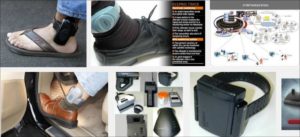Last Friday (15 February 2019), Justice Secretary David Gaule announced the national roll out of new GPS tags which will provide 24/7 location monitoring of offenders with the stated aims of helping to strengthen supervision, enforce exclusion zones and “give victims greater peace of mind”.
The GPS electronic tagging scheme has been fraught with difficulties and delays. Originally announced by Tony Blair’s government, the Public Accounts Committee described the procurement process as “a catastrophic waste of money” in early 2018.
How GPS tagging will work?
The GPS tags have so far been rolled out to 3 regions, the North West, Midlands and North East, with other regions due to go live in the coming months. The tags will be available across England and Wales by the summer.
The new technology is also set to be piloted in London (by the London Mayor’s Office for Policing and Crime) to monitor offenders released from prison who have been convicted of knife crime offences. Offenders will have their movements checked against locations of reported crimes, in an effort to tackle violence in the capital.
DCC Jon Stratford, Gloucestershire Police, NPCC Electronic Monitoring lead:
The potential benefits of using this new technology to better protect victims are recognised by the police service and we’re working closely with the Ministry of Justice to identify a suitable joint implementation programme.
A wide range of offenders will be eligible for the new tags, including those subject to court-imposed bail, community orders and suspended sentence orders, as well as those on Home Detention Curfew and indeterminate sentenced prisoners released by the Parole Board.
Location monitoring can be used to:
- enforce an exclusion zone – an offender or individual on bail can’t enter a specific location or area
- keep a given distance from a point or address, including victim’s address or that of a known criminal associate
- monitor an offender’s attendance at a certain activity – for example work or a rehabilitation programme
- monitor an offender’s movements to support discussions with probation about an offender’s lifestyle and behaviours
The tags will transmit an offender’s location 24/7 to a specialist monitoring unit in Manchester and if an offender enters an excluded zone and breaches their conditions, they face being recalled to prison or returned to court.
The new location monitoring capabilities will be in addition to the existing curfew tagging provision already in place, which monitors offenders on licence, community sentences and those on court bail. Around 60,000 individuals are subject to these tags each year.
Who will be eligible for tags?
The announcement also set out the criteria for GPS tagging:
- Location monitoring will be available for: court-imposed bail, community orders, suspended sentence orders, home detention curfew cases and Parole Board cases for life sentences, IPP (imprisonment for public protection) offences and extended determinate sentences.
- For tags used for ‘court imposed bail’ individual Police forces can choose to roll out the service as soon as it is available in their region. Some forces are keen to proceed with GPS tagging and we will continue to work closely with those who want further information before rolling this service out.
Evaluation findings
The MoJ also published the findings of an evaluation following a pilot involving 8 police forces, testing the delivery and usage of the GPS tags. The evaluation was a process evaluation and did not examine the impact on reoffending of offenders who were fitted with a tag. The main findings were:
- Partner agencies were enthusiastic about the prospect of using GPS location monitoring to help monitor and manage compliance with bail, sentence, and licence conditions.
- Clear and timely training and guidance for the staff involved in the setup and delivery of the pilot was highlighted as vital to effective delivery.
- The process of fitting tags was thought to have gone smoothly, although some concerns were raised in relation to the time taken to fit tags.
- GPS location monitoring was felt to support the effective management of offenders in the community and individuals on court bail in four key ways: supporting offender rehabilitation, facilitating risk management, informing decisions about whether a wearer should be recalled to custody or court, and providing evidence to either exonerate a wearer or link them to a crime.
- Key learning points include the importance of clear communication across and within partner agencies to enable a consistent approach to delivery, and the need for sufficient time and resources to develop the infrastructure to support the wider rollout of GPS location monitoring.
One offender who participated in the pilot of the project said:
I’ve walked in an exclusion zone before, not realising… that was before I had the tag on, so I wasn’t really bothered about getting seen. Now, with the tag, I knew full well that if I go in to that exclusion zone, I’m going to get seen no matter what.
In his major speech at the Reform Think Tank yesterday, Mr Gauke linked the GPS tags to the government’s intention to introduce a presumption against short prison sentences. It will be interesting to see whether Magistrates’ confidence in community sentences which has dropped noticeably since the introduction of the split public/private probation system, will be bolstered by the new tags. Of course, it will be also be critical whether the tags are just added to the conditions of those who would have received community sentences anyway or reserved for those at risk of custody.






8 responses
Wonder what problems will come from this?
Nobody seems to want to talk about the 4-year rule on HDC, Russell. I’ve never understood the logic. That could go quite a q=way to creating space in D Cat prisons and reducing the overall prison population. Will GPS tagging help?
Will GPS tags be used for non-violent crimes if the sentence was over 4 years, which is not eligible for standard HDC?
When will we know if gps tags are available for cat D prisoners.? It has all gone a bit quiet
Marvin
Isn’t it simple to wrap the tag in silver foil to stop it sending and receiving data?
If it stops sending and receiving, Andy then the operator knows and you are in breach for interfering with your tag.
Best wishes
Russell
I would like to know
If said person is on gps tag or any tag and has a “black box” at there address ( home address ) any address they were bailed too
, can any one from the public access this information I.e independent journalists per say is this information accessible to the public freely because if any one and every one can gain access to that said persons details isn’t that potentially putting them in danger
No they can’t.